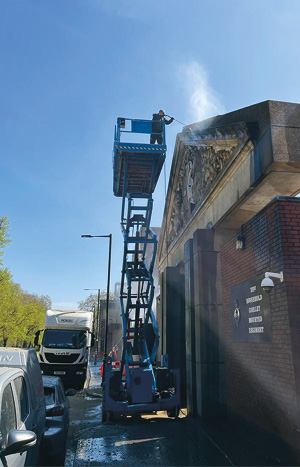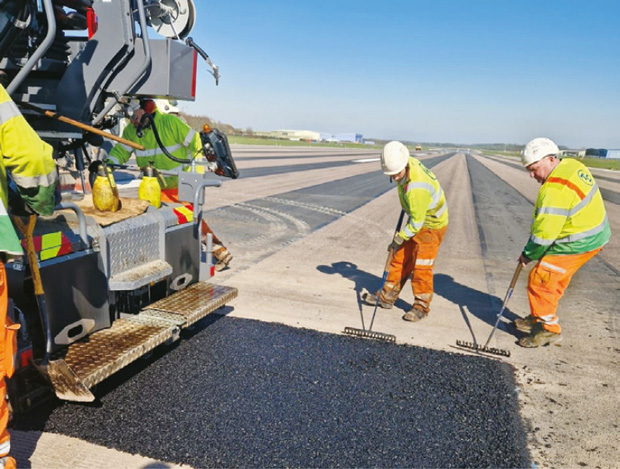DIVERSITY AND INNOVATION
Another important element of the FDIS programme was to build a wider and more diverse supply base; working with the larger companies and their smaller suppliers throughout the supply chain to support local economies around the country. By drawing on a much broader network of second and third tier suppliers there is now a much more local focus even at the tier one level.
Says Brewer: “As part of the procurement exercise we looked at how those organisations were going to give something back to the regions in which they were working.”
By encouraging suppliers to look at what they buy on a regular basis they can put a framework in place for a category management approach. For example, when one of the suppliers working on replacing a shared showered block and bathroom established a standard proposition, this meant that the estate and the supply chain could use the same sinks, tiles and panels etc as protocol, which could be rolled out more cost effectively and efficiently.
Says Brewer: “It now feels like we’ve got the best of both worlds as we’ve got that local focus but we are also working across these suppliers to make sure if one of them is doing something really well the others are able to draw on that.”
In another example, suppliers have been putting in place a system whereby all of the estate’s energy management systems are connected to central metering to enable better visibility of the estate’s power usage.
“We’re starting to see significant energy reductions,” says Brewer, “and once they have gone through the process of reconnecting all the metering and bringing the energy management systems into one place we’re getting about a 10 per cent energy reduction per establishment.
“We’ve also been running pilot schemes where we are potentially benefiting from 30 per cent energy savings in a single living accommodation block by installing devices such as thermostats on the radiators that are linked to sensors on the windows so that we don’t have windows open and radiators on at the same time.”
Another major innovation is the introduction of a ‘trust with consequences’ (TwC) contractual arrangement for delivering low value, high volume works in a quicker and more agile way. This initially covered projects worth up to £25,000 to bypass the usual tendering approvals processes – allowing work to start immediately. Its success has resulted in that limit being raised to £100,000.
Explains Brewer: “Basically, what it’s about is for simple work you can often be in a situation where the consequences of delaying work can cause more issues. We realised there was huge value in allowing people to get on with keeping things running well. It’s just saying that instead of spending weeks arguing over each individual piece of work we just let people get on with it and pay them the actual cost.
“I’m convinced we’re not only getting the work done more quickly but we are spending less money at the same time. It’s more efficient for us, for our suppliers and because we’re not asking them to give a fixed price quote they don’t have to build in risk which they transfer over to us on each and every job. It’s a more sensible way of doing business and because suppliers want a long relationship they don’t want anything to go wrong.
“We’ve got good scrutiny of this, with sample audits and carrying out checks, and making sure we’re getting what we pay for and it’s accelerated the pace at which we can deal with things which are low value but potentially have a big impact.”
 TwC covers a complete range of jobs, from the construction of a new bathroom block to installing a replacement boiler in a mess facility.
TwC covers a complete range of jobs, from the construction of a new bathroom block to installing a replacement boiler in a mess facility.
CAPABILITY BUILDING
Just over one year into the programme and Brewer admits that it wasn’t all plain sailing, as given the size of the operation it was a huge task to get the contracts mobilised and operational.
He says: “There are tens of thousands of people working on these contracts and more than a hundred thousand assets across the country. It’s a logistically tough exercise and we were genuinely worried if we would have a good continuity of service as we made that transition from one supplier to another.
“In our first year of operation we managed to deliver exactly the same as before but we did have ambitions to do more than that. When I look back, were we a bit over ambitious? We were asking a lot but with hindsight I’m delighted with what we achieved.”
He explains that while Year one was about transition and mobilisation, and creating that foundation for continuous improvement, there was still some great feedback from customers that the delivery performance was noticeably better in the first year of these new contracts than it had been previously. A priority for the FDIS programme now is to look at its planning processes – carried out jointly with the MOD front-line commands, drawing on the digital estate condition data to help inform the decision-making process.
Explains Brewer: “It’s also one of the areas where we want to draw on the expertise of our suppliers when we haven’t previously really engaged them in the process to help them understand what we need to prioritise.
“When I look back over this last year I’d describe it as one of capability building, and that goes a bit broader than just the FDIS programme. We know that front-line commands are as determined as we are to address this historic backlog of infrastructure and how important it is for the lived experience of their people and operations. All of the front-line commands have put infrastructure high up their list of priorities. What that means is there is a real appetite and ambition for more activity to improve things.”





